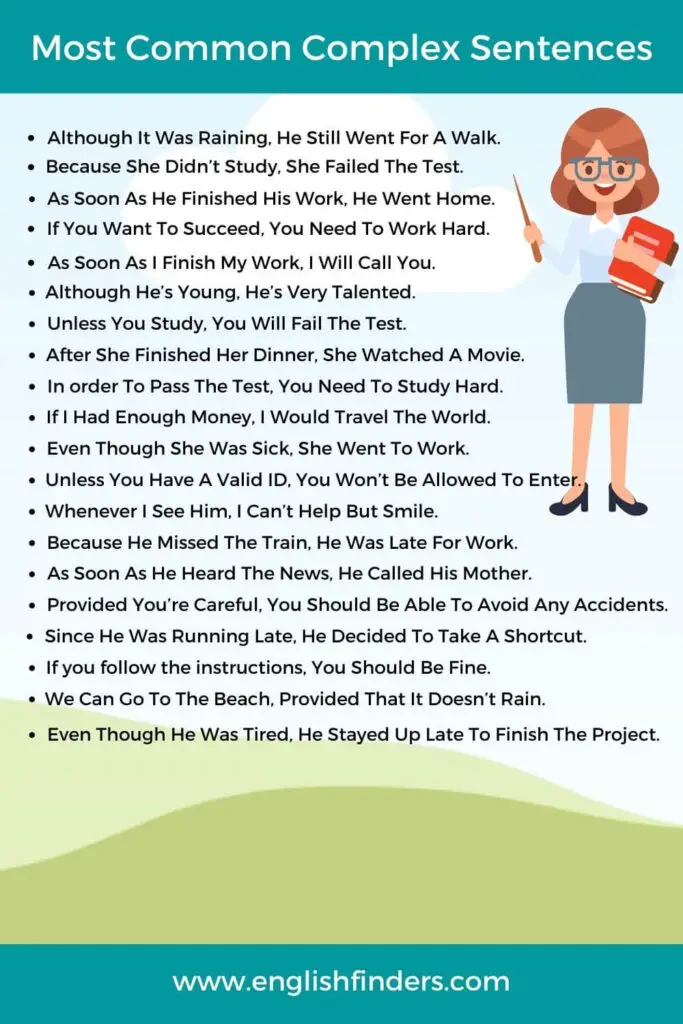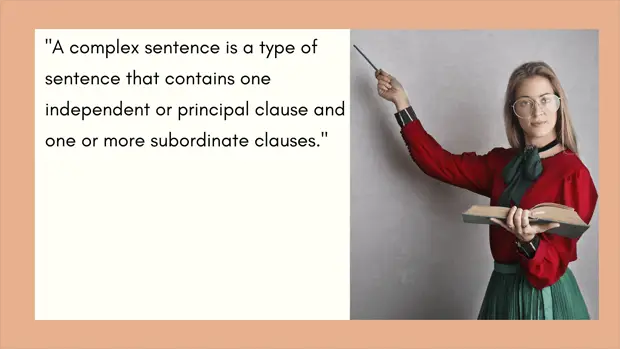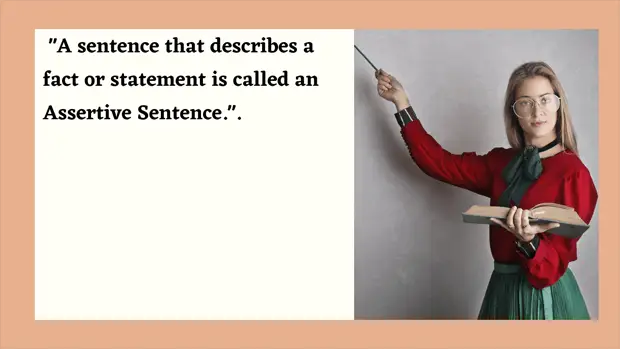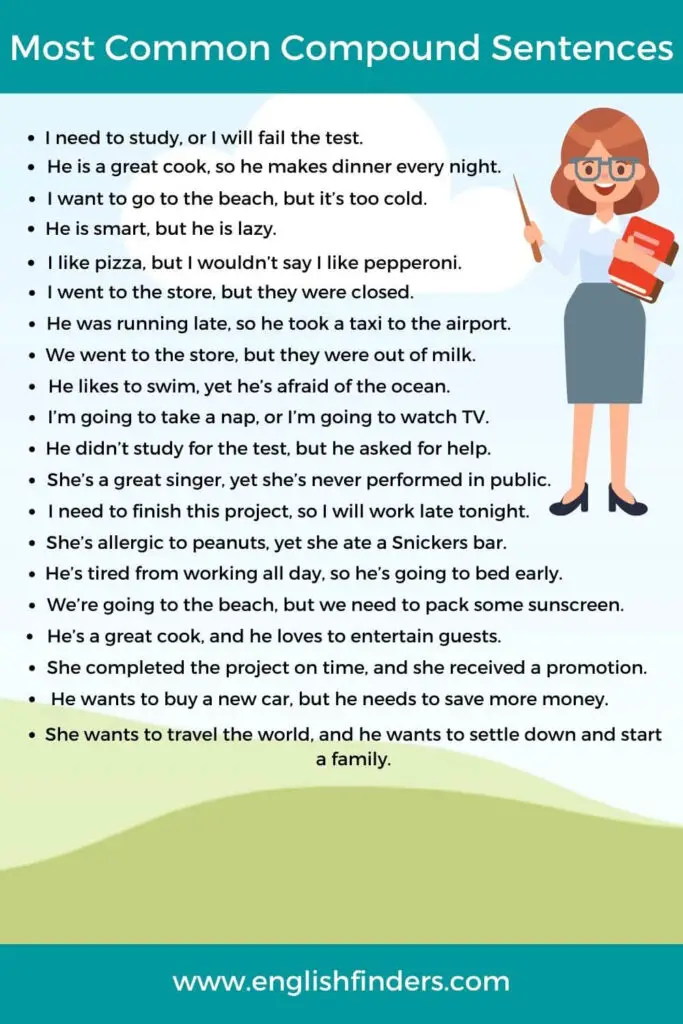Are you an English learner looking to improve your writing skills? Or you’re just looking to expand your knowledge of complex sentences in English? Either way, you’re in the right place!
A complex sentence is a sentence that contains one independent clause and at least one dependent clause, which is joined together using subordinating conjunctions, relative pronouns, or infinitive phrases. The independent clause can stand alone as a sentence, while the dependent clause cannot.
Complex sentences provide additional information or show the relationship between ideas more nuancedly than simple sentences. In this article, we’ll explore the 20 most common complex sentences in English. So, let’s dive in!
20 Examples of Complex Sentences with Explanations
Quick Navigation
Let’s walk you through the 20 most common examples of complex sentences with their explanations.
1. Although it was raining, he still went for a walk.
This is an example of a complex sentence that uses a subordinating conjunction (‘although’) to link two clauses. The first clause (‘Although it was raining’) sets the scene, while the second clause (‘he still went for a walk’) provides the action.
2. Because she didn’t study, she failed the test.
Here, the subordinating conjunction ‘because’ explains why the second clause’s action (‘she failed the test’) occurred.
3. Even though he was tired, he stayed up late to finish the project.
‘Even though’ is another subordinating conjunction that links the two clauses in this sentence. The first clause (‘Even though he was tired’) provides the context, while the second clause (‘he stayed up late to finish the project’) shows the action taken despite the fatigue.
4. Since he was running late, he decided to take a shortcut.
In this complex sentence, the subordinating conjunction ‘since’ is used to explain why the action in the second clause (‘he decided to take a shortcut’) was taken.
5. As soon as he finished his work, he went home.
‘As soon as’ is a subordinating conjunction that links the two clauses in this sentence. The first clause (‘As soon as he finished his work’) sets up the scenario, while the second (‘he went home’) provides the action taken.
6. If you want to succeed, you need to work hard.
This is an example of a complex sentence that links the two clauses with a conditional clause (‘if’). The first clause (‘If you want to succeed’) presents the condition, while the second clause (‘You need to work hard’) provides the necessary action.
7. As soon as I finish my work, I will call you.
This sentence also starts with a dependent clause (as soon as I finish my work) and is followed by an independent clause (I will call you). The dependent clause indicates the condition that must be met for the main clause to occur.
8. Provided that you follow the instructions, you should be fine.
‘Provided that’ is a subordinating conjunction that links the condition and the consequence in this complex sentence. The first clause (‘Provided that you follow the instructions’) sets the condition, while the second clause (‘You should be fine’) provides the consequence.
9. We can go to the beach, provided that it doesn’t rain.
This sentence uses the subordinating conjunction “provided that” to introduce a dependent clause (it doesn’t rain). The dependent clause indicates a condition that must be met for the main clause to occur.
10. Although he’s young, he’s very talented.
Here, the subordinating conjunction ‘although’ is used to link the two clauses in this complex sentence. The first clause (‘Although he’s young’) provides the context, while the second clause (‘he’s very talented’) provides the action taken despite his youth.
11. Unless you study, you will fail the test.
This sentence starts with a dependent clause (unless you study) and is followed by an independent clause (you will fail the test). The dependent clause introduces a condition that must be met to avoid an undesirable consequence.
12. After she finished her dinner, she watched a movie.
This sentence begins with a dependent clause (after she finished her dinner) and is followed by an independent clause (she watched a movie). The dependent clause indicates the time or sequence of events.
13. In order to pass the test, you need to study hard.
This is an example of a complex sentence that uses an infinitive phrase (‘to pass the test’) to link the two clauses. The first clause (‘In order to pass the test’) provides the necessary action, while the second clause (‘You need to study hard’) reinforces the importance of that action.
14. Provided you’re careful, you should be able to avoid any accidents.
‘Provided’ is a subordinating conjunction that links the condition and the consequence in this complex sentence. The first clause (‘Provided you’re careful’) sets the condition, while the second clause (‘You should be able to avoid any accidents’) provides the consequence.
15. If I had enough money, I would travel the world.
This sentence starts with a dependent clause (if I had enough money) and is followed by an independent clause (I would travel the world). The dependent clause introduces a hypothetical condition that must be met for the main clause to occur.
16. Even though she was sick, she went to work.
‘Even though’ is a subordinating conjunction that links the two clauses in this sentence. The first clause (‘Even though she was sick’) provides the context, while the second clause (‘she went to work’) provides the action taken despite the illness.
17. Unless you have a valid ID, you won’t be allowed to enter.
In this complex sentence, the subordinating conjunction ‘unless’ presents a negative condition in the first clause (‘Unless you have a valid ID’), while the second clause (‘you won’t be allowed to enter’) provides the consequence.
18. Whenever I see him, I can’t help but smile.
‘Whenever’ is a subordinating conjunction that links the two clauses in this sentence. The first clause (‘Whenever I see him’) sets up the scenario, while the second clause (‘I can’t help but smile’) provides the reaction.
19. Because he missed the train, he was late for work.
This sentence begins with a dependent clause (because he missed the train) and is followed by an independent clause (he was late for work). The dependent clause explains the cause of the main clause.
20. As soon as he heard the news, he called his mother.
‘As soon as’ is a subordinating conjunction that links the two clauses in this sentence. The first clause (‘As soon as he heard the news’) sets up the scenario, while the second clause (‘he called his mother’) provides the immediate action taken.
And there you have it! These are the 20 most common complex sentences in English. By understanding how to use these structures effectively, you’ll be well on your way to becoming a more confident and skilled writer.

Azizul Hakim is the founder & CEO of englishfinders.com. He is a passionate writer, English instructor, and content creator. He has completed his graduation and post-graduation in English language and literature.





